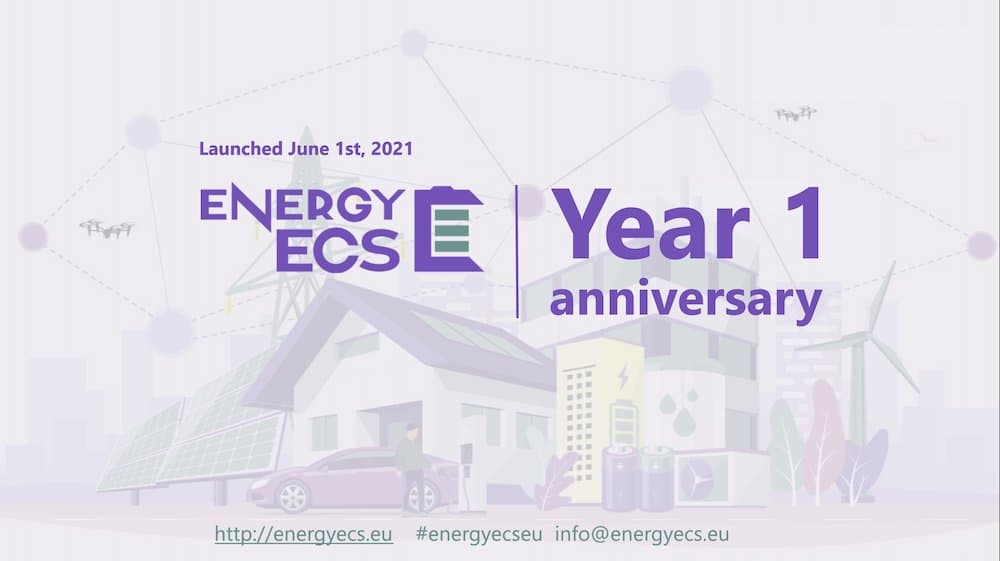



June 2022 marks the one year milestone of the Energy ECS project, for which Fixposition is working alongside many other European companies to develop smart and secure energy solutions for future mobility and green-energy transition.
The company said that the past year has proved to be both fruitful and challenging, working with 30 partners of technology-related industries from 8 different European countries. All partners managed to collaborate closely despite the global challenges such as the pandemic and supply chain issues.
In the coming 2 years, the project team will continue to work together to explore solutions to develop smart and secure energy solutions for future mobility and the green-energy transition.
The advancement of e-mobility is a key part of the green energy transition. Together with its direct role in reducing emissions, the adoption of e-mobility also has a crucial indirect role as a grid stability element. E-mobility accelerates the transition to wind and solar energy production, and thus reduces the use of fossil fuels in the energy mix.
Fixposition is part of Use Case 1 and 6 of the Energy ECS project. While also working alongside many other companies, Fixposition will be able to further develop its technology for two specific applications:
Use Case 1 of the project named ‘Drone Zones’ is about creating an autonomous drone ecosystem by deploying drones in cities which will be able to dock to photovoltaic powered charging stations in the city and on electrical buses to hitch a ride while charging their batteries. The precise approach and landing of the drones to these charging stations is a key capability for this system. Fixposition is developing and customizing its Vision-RTK 2 positioning sensor for the use on the drones and buses in this scenario.
In Use Case 6 of the project ‘Autonomous Driving of EV to Charging Stations’, EVs are enabled to autonomously navigate to their charging stations in a bus depot. Fixposition is developing its Vision-RTK 2 technology to be a part of the localization pipeline guiding EVs on a cm-level.

 Lukas Meier, CTO and Co-Founder of Fixposition, participated in Use Case 1 meeting in Reykjavik, Iceland in April 2022
Lukas Meier, CTO and Co-Founder of Fixposition, participated in Use Case 1 meeting in Reykjavik, Iceland in April 2022
A recap of the Energy ECS project:
Launched in June 2021, the Energy ECS project is an extensive 3-year project with a total of 30 partners from eight European countries and an overall budget of €33 million. It will pave the way for an emerging new European business and technology ecosystem aimed at tackling various energy related challenges for the future of mobility. The project accelerates Europe’s decarbonization goals for 2050.
It is co-financed via the ECSEL Joint Undertaking of the EU Horizon 2020, national funding agencies of the participating countries, and the consortium partners. The project consortium consists of 16 small and mid-sized enterprises, eight large enterprises and six research and technology organizations from Finland, Austria, Germany, Ireland, Iceland, Italy, Sweden, and Switzerland. The consortium brings together all the players needed to realize the field testable solutions.
The Energy ECS project will build on six use cases that represent different angles on future mobility and energy: enablers of new logistics modes, energy independent intermodal transport, charging technologies and opportunities, grid stability responding to bi-directional charging, and enablers of safe autonomous driving.
By 2030, the new technologies developed in Energy ECS are expected to generate turnover for the participating companies. In addition, the project is aimed at enabling increased market share and market leadership for the 30 partners. The other expected impacts include dozens of new collaborations, hundreds of new jobs, and additional investments.





Related Posts
Skyeton Integrates Radiation Surveillance Sensors into Raybird UAS Expands Mission
Schiebel to Establish Dedicated UK Entity Expand Defence Operations
Alpha Unmanned Parallel Flight Partnership Targets Long-Endurance Heavy-Lift UAV Operations